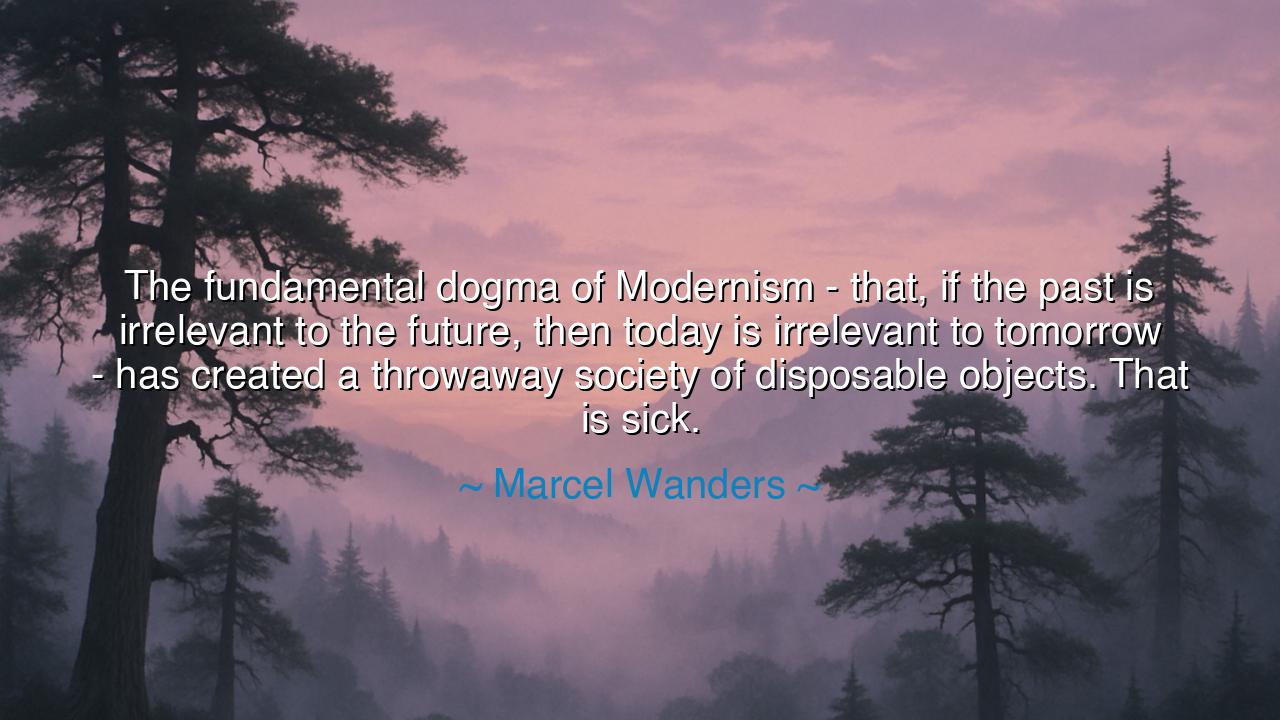
The fundamental dogma of Modernism - that, if the past is
The fundamental dogma of Modernism - that, if the past is irrelevant to the future, then today is irrelevant to tomorrow - has created a throwaway society of disposable objects. That is sick.






In the relentless march of modernity, a dangerous belief has taken root: the disregard for the past, the denial of its wisdom and its lessons. Marcel Wanders captures the essence of this ideology in his words, "The fundamental dogma of Modernism—that, if the past is irrelevant to the future, then today is irrelevant to tomorrow—has created a throwaway society of disposable objects. That is sick." This belief, that the past and the future are disconnected, has given rise to a world where everything—from ideas to objects—is deemed disposable, discarded without thought or care. A throwaway society has emerged, one where the sacredness of creation is lost, and the value of enduring craftsmanship is forgotten.
In ancient times, the craftsman took pride in his work. Whether it was the builders of the great pyramids of Egypt or the sculptors of Athens, their creations were meant to last—to withstand the ravages of time. These artisans understood that their work was not just for the moment; it was a part of a larger tapestry, woven into the fabric of history. Every stone laid in the temples, every brushstroke in the murals, was made with the knowledge that their work would outlive them, that it would become a legacy for future generations to admire and learn from. The idea that something might be cast aside without regard for its long-term significance would have been seen as anathema to these ancient craftsmen, who poured their souls into what they created.
The rise of modernism has turned this ancient wisdom on its head. In the pursuit of progress, we have lost sight of the value of the past, dismissing it as irrelevant to the rapid pace of the present. We no longer build with the future in mind; we build for immediacy, for the fleeting gratification of now. Marcel Wanders decries this mindset, recognizing it for what it is—a sickness. It is a world where products are designed to be discarded, where ideas are constantly churned out and then discarded in the name of innovation, leaving nothing of substance behind. This philosophy has bled into every corner of our lives, from the things we buy to the way we live. In discarding the past, we have lost the wisdom that can guide us toward a more meaningful future.
Consider the story of the Roman Empire, a civilization that spanned centuries and shaped the course of history. The Romans did not see themselves as separate from the past; instead, they celebrated their ancestors, learning from their triumphs and failures. Every Roman knew the stories of their forebears, and those stories guided them as they crafted their own futures. Their works of art, their architecture, and their written records were not just for the present; they were investments in the future, designed to endure the ravages of time. Yet, as we look around us today, we see that this connection to the past has been severed, and we live in a world where what is new is often deemed better, regardless of its true value.
The danger of this mindset is not just the loss of history, but the soul-deep emptiness it breeds. When we throw away the past, we sever ourselves from the deep roots that nourish us. We forget that the lessons of history, of sacrifice, and honor, are what shape the decisions we make in the present. We are disconnected from the spirit of our ancestors, those who labored not for immediate glory, but for the betterment of future generations. In our haste to throw away the past, we risk losing the wisdom that could guide us through the storms of the present and into the future.
The lesson that Wanders imparts is one of respect—respect for the past, respect for the things that have endured, and respect for the legacy that each of us must leave behind. Creation is a sacred act, one that should be infused with the understanding that what we make today will echo in the lives of those who come after us. To live in a throwaway society is to live without purpose, to act without foresight. The challenge is to reclaim the lost art of crafting not just for today, but for the generations that will follow.
So let us turn our gaze back to the past, not as something to be discarded, but as something to be honored. Let us learn from the ancient wisdom that has withstood the test of time. In our daily lives, let us seek to create things of lasting value—whether in our work, our relationships, or our legacy. We must remember that what we leave behind is not just for ourselves, but for all those who come after us. Let us stop building a world of disposable things and begin crafting a world that endures, a world that values the past, shapes the present, and nourishes the future.






AAdministratorAdministrator
Welcome, honored guests. Please leave a comment, we will respond soon